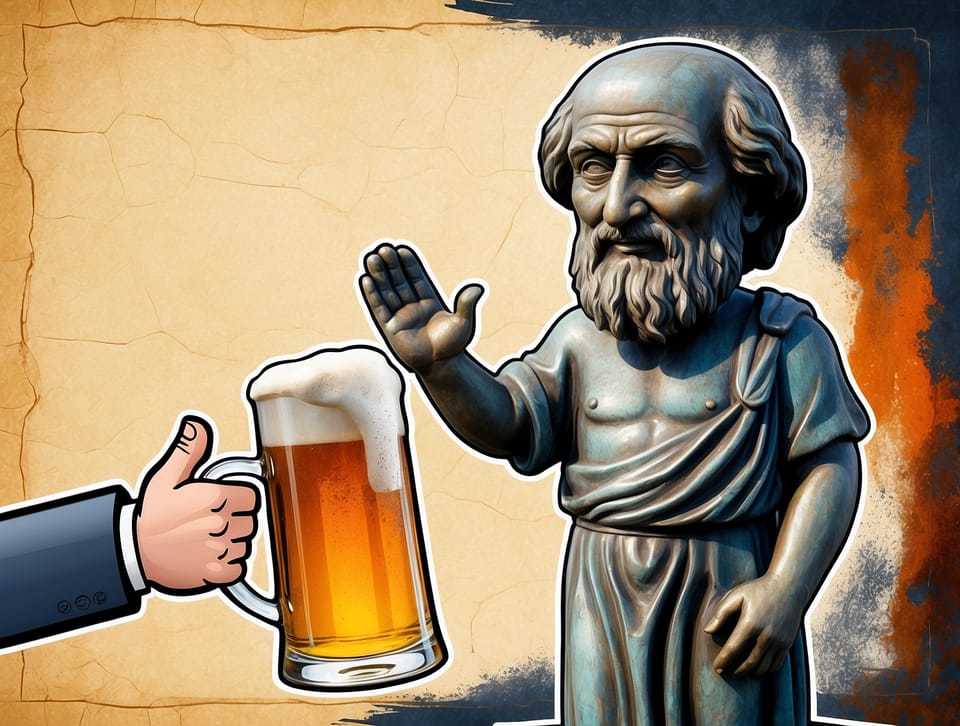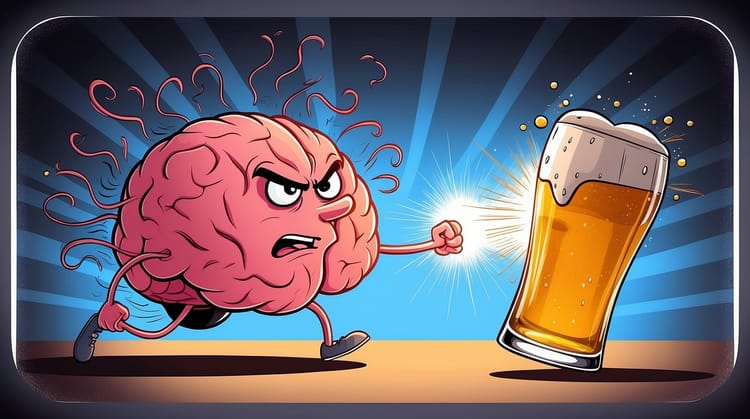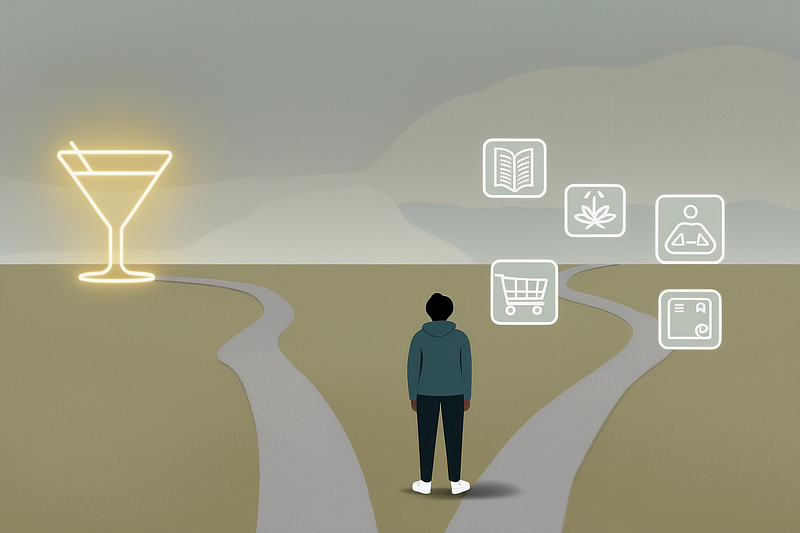The Power of Refusing That First Drink

You know the scene — your old habits whisper, “Just one,” but your wiser self stands firm with a resolute “Not today.” This moment, my friends is where the rubber meets the road in our journey of sobriety and self-mastery.
Here’s a powerful truth to anchor your resolve: “You won’t have your second drink if you don’t have your first.” Simple yet profound, this isn’t just about moderation; it’s about embracing sobriety and reclaiming control over our lives. As Stoics, we’re all about that self-mastery, right? It’s time to put into practice what we’ve been preaching.
The Domino Effect of Decision-Making
You’re stacking dominos and one little push and boom — you’ve got a whole chain reaction going. Our choices, especially regarding booze, work in much the same way. That first sip? It’s the domino master, setting off a wild cascade of “just one more” until suddenly you’re waking up with a killer hangover and a suitcase full of regret.
Epictetus, one of our Stoic sages, said: “Everything has two handles, one by which it may be borne, another by which it may not”. In our sobriety journey, we’re choosing to grab the handle of clarity and purpose, carrying on with strength and dignity.
The ancient Stoics were all about self-control and conscious decision-making. They knew our choices, even seemingly small ones, can have significant consequences. Focusing on that initial decision to skip that first drink, we’re flexing our Stoic muscles and practising true self-mastery.
The Power of Daily Practice
Let’s talk about building this strength day by day. Epictetus suggested using the chain method to eliminate negative habits. It’s not unlike taking sobriety “one day at a time.” Start with one day of not drinking. Then, do the same the following day and the day after that. Build a chain and then work not to break it. Don’t ruin your streak. This approach aligns perfectly with modern recovery methods and showcases the timeless wisdom of Stoic philosophy.
We’re not aiming for perfection here. We’re all works in progress, striving to be better versions of ourselves. Each day we choose not to drink is a day we’re actively shaping ourselves into the person we want to be.
The Ripple Effect on Overall Well-being
Choosing not to take that first drink can have profound effects that ripple through various aspects of your life:
- Mental Clarity: Preserve your clarity of thought and decision-making abilities. This aligns with the Stoic emphasis on rational thinking and clear judgment. As Marcus Aurelius reminds us, we should “accept only what is true”.
- Physical Health: Enjoy better sleep and more energy, and avoid the physical toll of alcohol. The Stoics believed in caring for our bodies as vessels for our minds.
- Emotional Stability: Avoid alcohol’s exacerbating effects to maintain emotional equilibrium. This practice ties into the Stoic practice of managing our emotions and aligns with Marcus Aurelius’s advice to “match our needs and wants with what is in our control.”
- Self-Control: Strengthen your self-control with each choice to abstain. This is a core tenet of Stoic philosophy — mastery over oneself.
- Freedom: Reclaim the “freedom to abstain” from harmful habits. True freedom, according to the Stoics, comes from self-discipline.
- Higher Pleasures: Open yourself up to what Seneca calls “the pleasures of the mind, which are higher and less uncertain”. This could mean deeper conversations, more fulfilling hobbies, or simply a greater appreciation for life’s subtle joys.
- Long-term Satisfaction: Align with Stoic philosophy by considering the long-term perspective. Short-term pleasure often leads to long-term pain, while short-term discipline leads to long-term satisfaction.
Practical Strategies for Implementing This Approach
- Hit the pause button: When tempted, fast forward to tomorrow morning. Picture how you’ll feel if you start drinking versus if you don’t. This aligns with the Stoic practice of visualizing potential outcomes.
- Simplify your choices: Focus on not taking that first drink rather than wrestling with moderation. Remember, it’s easier to abstain entirely than to constantly negotiate with yourself. As Queen Gertrude said in Hamlet, “More matter with less art”. In other words, keep it simple and straightforward.
- Grab the right handle: As Epictetus would say, choose the handle of sobriety. This metaphor can be a powerful visual reminder when facing temptation.
- Remember the domino effect: One drink can lead to many more. Visualize that chain reaction and decide if it’s worth setting in motion.
- Educate yourself: As Epictetus said, “Only the educated are free”. The more you understand about addiction and recovery, the better equipped you’ll be to make wise choices.
- Practice daily: Make sobriety a daily practice, just as Stoicism a daily practice. As Ryan Holiday of “The Daily Stoic” suggests, you can get involved with Stoicism and make it a daily practice.
- Work for the common good: Remember that your sobriety doesn’t just benefit you. It positively impacts your relationships, your work, and your community. This aligns with Marcus Aurelius’s advice to “work for the common good”. Think of doing service in AA meetings.
- Embrace what nature has in store: Accept that challenges will come, but trust in your ability to face them sober. This echoes Marcus Aurelius’s advice to “embrace what nature has in store for us”.
The Stoic Perspective on Drinking
Seneca, one of the great Stoic philosophers, had some particularly poignant thoughts. He believed it was easier to prove the ugliness and offensiveness of drunkenness through facts rather than abstract moralizing.
So let’s get real: Although continued bouts of drunkenness don’t just affect us at the moment — they can bestialize the soul, making us irritable and driving us wild even when we’re sober.
Think about it: it’s infinitely easier to say no to that first drink than to stop after you’ve started. Once we start, our resolve often crumbles faster than a sandcastle in a tsunami. But by exercising control over that first choice, we maintain our clarity, freedom, and dignity.
The Stoic Approach to Life’s Challenges
The Stoics weren’t just concerned with drinking, of course. Their philosophy was about facing life’s challenges with courage and wisdom. The Stoics sought to organize and present their collective wisdom in a digestible, accessible, and coherent form. They focused on three key disciplines: Perception, Action, and Will.
In the context of our struggle with that first drink, we can apply these disciplines:
- Perception: How do we perceive the drink in front of us? Is it a source of pleasure or a potential threat to our well-being?
- Action: What action will we take? Will we reach for the drink or choose a different path?
- Will: Can we summon the willpower to resist, even when it’s difficult?
By applying these Stoic principles to our decision-making process, we can strengthen our resolve and make choices that align with our true values and goals.
The Journey of Self-Improvement
Remember, this journey isn’t just about avoiding alcohol — it’s about becoming the best version of yourself. It’s about, as Marcus Aurelius might say, being both a scholar and a soldier in the good fight. We’re not just reading about Stoicism; we’re putting it into practice daily.
As Seneca wisely noted, “Many words have been spoken by Plato, Zeno, Chrysippus, Posidonius, and by a whole host of equally excellent Stoics. I’ll tell you how people can prove their words to be their own — by putting into practice what they’ve been preaching”. This is our challenge: to not just read about Stoic principles but to live them.
The Power of Choice
In the end, it all comes down to choice. Each time we’re faced with that first drink, we have the power to choose. We can choose clarity over confusion, control over chaos, and growth over stagnation.
As we wrap up, we’ll mix some philosophies. The Serenity prayer
“God, grant me the serenity to accept the things I cannot change, the courage to change the things I can, and the wisdom to know the difference.”
You cannot change the past or control every circumstance, but you can control your choice not to take that first drink.
Who knows how much time you have left or what awaits us tomorrow? Make today count by choosing clarity, choosing control, choosing you.
Remember, you’re not alone in this journey. We’re all works in progress, striving to be better each day. So, let’s raise a glass of sparkling water to clarity, courage, and the power of refusing that first drink.
Here’s to being Sober Stoics!




Member discussion